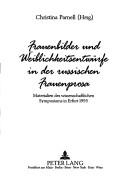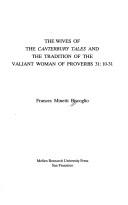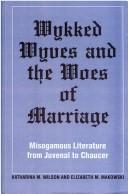| Listing 1 - 6 of 6 |
Sort by
|

ISBN: 0691117071 Year: 2004 Publisher: Princeton, N.J. Princeton University Press
Abstract | Keywords | Export | Availability | Bookmark
 Loading...
Loading...Choose an application
- Reference Manager
- EndNote
- RefWorks (Direct export to RefWorks)
Folklore --- Literature --- sprookjes --- literaire adaptatie --- jeugdliteratuur --- Bluebeard (Legendary character). --- Bluebeard (Legendary character) in literature. --- Wives in literature. --- Wives --- Women in literature. --- Women in motion pictures. --- Women

ISBN: 3631301812 Year: 1996 Publisher: Frankfurt am Main Lang
Abstract | Keywords | Export | Availability | Bookmark
 Loading...
Loading...Choose an application
- Reference Manager
- EndNote
- RefWorks (Direct export to RefWorks)
Conferences - Meetings --- Russian prose literature --- Wives in literature --- Women and literature --- Women in literature --- Women authors --- History and criticism --- Congresses. --- Congresses --- Literature --- Russian literature --- Women authors&delete& --- History and criticism&delete&

ISBN: 0773498036 Year: 1993 Publisher: San Francisco (Calif.): Mellen Research University Press
Abstract | Keywords | Export | Availability | Bookmark
 Loading...
Loading...Choose an application
- Reference Manager
- EndNote
- RefWorks (Direct export to RefWorks)
Wives in literature --- Women and literature --- Women in literature --- Women --- History --- Biblical teaching --- Chaucer, Geoffrey, --- Chaucer, Geoffrey, --- Chaucer, Geoffrey, --- Characters --- Women. --- Religion. --- Bible. --- Biblia --- Biblia --- Criticism, interpretation, etc. --- Criticism, interpretation, etc. --- History --- In literature.

ISBN: 0585068836 9780585068831 079140062X 1438424191 9781438424194 Year: 1990 Publisher: Albany, NY State University of New York Press
Abstract | Keywords | Export | Availability | Bookmark
 Loading...
Loading...Choose an application
- Reference Manager
- EndNote
- RefWorks (Direct export to RefWorks)
The distrust and hatred of matrimony is a recurring theme in Western literature. In this volume, the authors show that in their repeated imagery, continuous themes, and rhetorical devices, misogamous texts closely parallel and reflect economic and demographic shifts, and theological and legal innovation. Analysis of the literature demonstrates a link between the growing secularism and careerism of the late middle ages and the reduction of women's social status and public options.
Literature, Medieval --- Satire, Medieval --- Marriage customs and rites, Medieval. --- Marriage in literature. --- Misogyny in literature. --- Wives in literature. --- Women in literature. --- Woman (Christian theology) in literature --- Women in drama --- Women in poetry --- Medieval marriage customs and rites --- Medieval satire --- History and criticism. --- Juvenal --- Giovenale, D. Giunio --- Juvenalis, Decimus Junius --- Juvénal --- Influence. --- Marriage customs and rites, Medieval --- Marriage in literature --- Misogyny in literature --- Wives in literature --- Women in literature --- 82.04 --- 82:396 --- 82:396 Literatuur en feminisme --- Literatuur en feminisme --- 82.04 Literaire thema's --- Literaire thema's --- History and criticism --- Iuvenalis, Decimus Iunius --- Iuvenalis, Decimus Junius --- Giovenale --- Iouvenalēs --- I︠U︡venal, D. I︠U︡nīĭ --- Yuvenalis --- Giovenale, Decimo Giunio
Book
ISBN: 9783826041259 Year: 2009 Publisher: Würzburg : Königshausen & Neumann,
Abstract | Keywords | Export | Availability | Bookmark
 Loading...
Loading...Choose an application
- Reference Manager
- EndNote
- RefWorks (Direct export to RefWorks)
Young women in literature. --- Wives in literature. --- Girls in literature. --- Mermaids in literature. --- Storm, Theodor (1817-1888) --- Féminité (psychologie) dans la littérature --- Critique et interprétation --- Storm, Theodor, --- Criticism and interpretation. --- Féminité (psychologie) dans la littérature --- Critique et interprétation
Book
ISBN: 9780812249606 0812249607 0812294483 Year: 2018 Publisher: Philadelphia University of Pennsylvania Press
Abstract | Keywords | Export | Availability | Bookmark
 Loading...
Loading...Choose an application
- Reference Manager
- EndNote
- RefWorks (Direct export to RefWorks)
Conduct Becoming examines a new genre of late medieval writing that focuses on a wife's virtuous conduct and ability of such conduct to alter marital and social relations in the world. Considering a range of texts written for women-the journees chretiennes or daily guides for Christian living, secular counsel from husbands and fathers such as Le Livre du Chevalier de La Tour Landry and Le Menagier de Paris, and literary narratives such as the Griselda story-Glenn D. Burger argues that, over the course of the long fourteenth century, the "invention" of the good wife in discourses of sacramental marriage, private devotion, and personal conduct reconfigured how female embodiment was understood. While the period inherits a strongly antifeminist tradition that views the female body as naturally wayward and sensual, late medieval conduct texts for women outline models of feminine virtue that show the good wife as an identity with positive influence in the world. Because these manuals imagine how to be a good wife as necessarily entangled with how to be a good husband, they also move their readers to consider such gendered and sexed identities in relational terms and to embrace a model of self-restraint significantly different from that of clerical celibacy. Conduct literature addressed to the good wife thus reshapes how late medieval audiences thought about the process of becoming a good person more generally.
Wives --- Sex role --- Women --- Wives in literature --- Conduct of life in literature --- Marriage in literature --- Virtue in literature --- Literature, Medieval --- Human females --- Wimmin --- Woman --- Womon --- Womyn --- Females --- Human beings --- Femininity --- Gender role --- Sex (Psychology) --- Sex differences (Psychology) --- Social role --- Gender expression --- Sexism --- Spouses --- Housewives --- Married women --- Conduct of life --- History --- Religious life --- Religious aspects --- Christianity --- Books and reading --- History and criticism --- History and criticism. --- Gender roles --- Gendered role --- Gendered roles --- Role, Gender --- Role, Gendered --- Role, Sex --- Roles, Gender --- Roles, Gendered --- Roles, Sex --- Sex roles --- Cultural Studies. --- Gender Studies. --- Literature. --- Medieval and Renaissance Studies. --- Women's Studies.
| Listing 1 - 6 of 6 |
Sort by
|

 Search
Search Feedback
Feedback About UniCat
About UniCat  Help
Help News
News